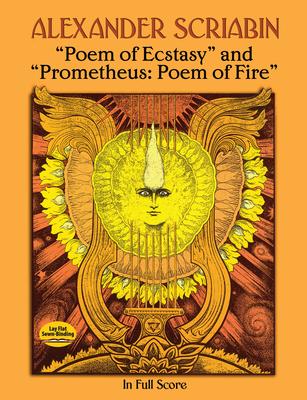
Poem of Ecstasy and Prometheus: Poem of Fire: In Full Score
(Write a Review)
Paperback
$14.95
Scriabin's last two orchestral works were the products of a virtual delirium of composing. Simultaneously refining his collection of verses called "Poem of Ecstasy" and the related symphony, Scriabin never forgot the rapture of composing this work about creation and self-fulfillment: "I gasp for breath, but oh, what bliss! The very meter kindles the meaning..."
"Prometheus: Poem of Fire," Scriabin's last and most revolutionary symphony, portrays humanity's epic journey from the beginning of time to the wondrous self-realization that followed the gift of fire and light, which made creative vision possible. Massively scored, "Prometheus" incorporates a "color organ" to bathe the performance space in a vast interplay of colored lights.
For the music professional and every student of composition, orchestration, and conducting, both scores are strikingly original and instructive. Equally fascinating are Scriabin's approach to composition, the extraordinary sonorities of his orchestra, and his fanciful, often supercharged performance instructions that replace conventional words for tempo, mood, and expression.
Scriabin's last two orchestral works were the products of a virtual delirium of composing. Simultaneously refining his collection of verses called "Poem of Ecstasy" and the related symphony, Scriabin never forgot the rapture of composing this work about creation and self-fulfillment: "I gasp for breath, but oh, what bliss! The very meter kindles the meaning..."
"Prometheus: Poem of Fire," Scriabin's last and most revolutionary symphony, portrays humanity's epic journey from the beginning of time to the wondrous self-realization that followed the gift of fire and light, which made creative vision possible. Massively scored, "Prometheus" incorporates a "color organ" to bathe the performance space in a vast interplay of colored lights.
For the music professional and every student of composition, orchestration, and conducting, both scores are strikingly original and instructive. Equally fascinating are Scriabin's approach to composition, the extraordinary sonorities of his orchestra, and his fanciful, often supercharged performance instructions that replace conventional words for tempo, mood, and expression.
Paperback
$14.95